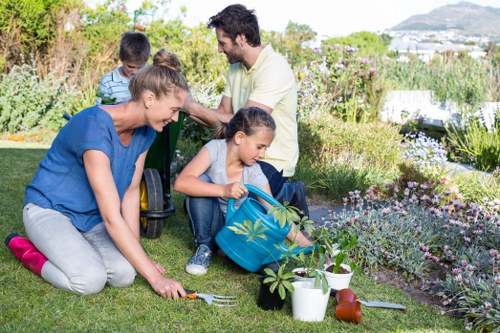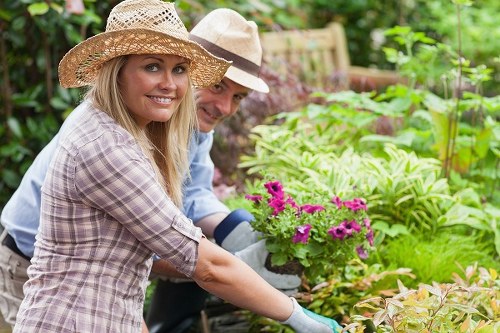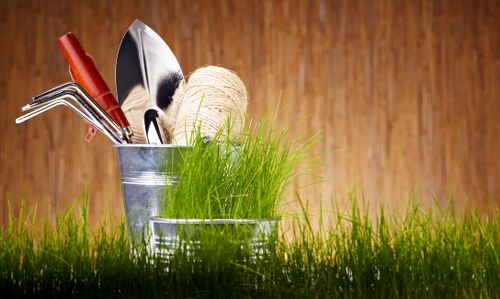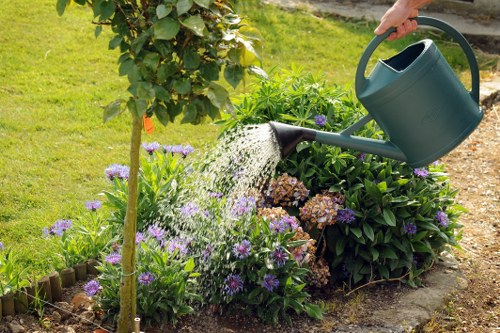Comprehensive Guide to Garden Maintenance in Teddington

Introduction to Garden Maintenance
Maintaining a beautiful garden in Teddington requires dedication, knowledge, and the right techniques. Whether you're a seasoned gardener or a beginner, understanding the fundamentals of garden maintenance can transform your outdoor space into a thriving oasis.
In Teddington, where the climate and soil conditions present unique challenges, tailored garden maintenance practices are essential. This guide explores various aspects of garden upkeep to help you achieve a lush and vibrant garden all year round.
From pruning and weeding to soil health and pest control, we'll cover all the essential tasks that ensure your garden remains healthy and aesthetically pleasing. Let's delve into the key components of effective garden maintenance in Teddington.

Seasonal Garden Maintenance
Spring Maintenance
Spring is a crucial time for garden maintenance in Teddington. With the arrival of warmer weather, it's the perfect opportunity to prepare your garden for the growing season. Start by clearing out any debris accumulated over the winter months. This includes removing dead leaves, branches, and any unwanted plant material.
Next, focus on soil preparation. Testing the soil pH and nutrient levels can help determine if any amendments are needed. Adding compost or other organic matter can enrich the soil, promoting healthy plant growth. Additionally, planting early spring flowers and vegetables sets the foundation for a productive garden.
Pruning is another essential task during spring. Removing damaged or dead branches encourages new growth and maintains the shape of your plants. Proper pruning techniques not only enhance the appearance of your garden but also improve plant health and resilience against pests.

Summer Maintenance
Summer in Teddington brings long days and abundant sunlight, which are ideal for vigorous plant growth. However, this season also presents challenges like heat stress and increased pest activity. Regular watering is paramount during summer months. It's best to water early in the morning or late in the evening to minimize evaporation and ensure that plants receive adequate moisture.
Mulching is an effective way to conserve soil moisture and regulate temperature. Applying a layer of mulch around plants helps retain moisture, suppress weeds, and improve soil structure. Organic mulches, such as bark or straw, also add nutrients to the soil as they decompose.
Pest control is another critical aspect of summer garden maintenance. Keep an eye out for common garden pests like aphids, slugs, and snails. Implementing natural pest control methods, such as introducing beneficial insects or using organic pesticides, can help manage infestations without harming your plants or the environment.

Autumn Maintenance
As the temperatures begin to cool in Teddington, autumn becomes a time for preparing your garden for the upcoming winter. Start by harvesting any remaining vegetables and flowers, ensuring that plants are free from pests and diseases before the cold sets in.
Leaf litter can be both a challenge and an opportunity. While excessive leaves can smother your lawn and garden beds, they can also be used as mulch or compost material. Raking and composting fallen leaves enriches your soil and provides valuable nutrients for spring growth.
Planting cover crops is another beneficial practice during autumn. Cover crops help prevent soil erosion, improve soil fertility, and suppress weeds. Choosing the right cover crops for Teddington's climate ensures that your soil remains in excellent condition for the next planting season.

Winter Maintenance
Winter garden maintenance in Teddington focuses on protecting your plants and preparing for the next growing season. Start by insulating sensitive plants with burlap or frost covers to shield them from harsh weather conditions. Pruning dormant trees and shrubs helps maintain their health and structure.
It's also an ideal time to plan your garden layout and select new plants for the upcoming year. Researching and ordering seeds or seedlings in advance ensures that you're ready to plant as soon as the weather becomes favorable.
Regularly monitoring stored tools and equipment prevents rust and wear, ensuring that your garden maintenance tools are in top condition when spring arrives.

Essential Garden Maintenance Tasks
Pruning and Trimming
Pruning is vital for promoting healthy plant growth and maintaining the desired shape and size of your plants. Proper pruning techniques vary depending on the plant species and the time of year. It's important to use sharp, clean tools to make precise cuts and reduce the risk of disease transmission.
Regular trimming of hedges and shrubs not only enhances their appearance but also encourages denser foliage and prevents overgrowth. Additionally, removing dead or diseased branches improves the overall health and longevity of your plants.
For fruit-bearing trees, timely pruning can significantly impact the quality and quantity of the harvest. By thinning out excess branches, you allow more sunlight and air to reach the fruit, resulting in better development and reduced risk of rot.

Weeding
Weeds compete with your garden plants for essential nutrients, water, and sunlight. Effective weeding is crucial for maintaining a healthy and vibrant garden. Regularly inspect your garden beds and remove weeds promptly to prevent them from establishing deep roots and spreading.
Mulching is an excellent strategy to suppress weed growth naturally. By covering the soil surface with organic mulch, you reduce the light available for weed seeds to germinate, minimizing their presence in your garden.
For persistent weeds, consider implementing manual removal methods or using environmentally friendly herbicides. Avoid using chemical weed killers that can harm beneficial plants and disrupt the ecosystem of your garden.

Soil Health and Fertilization
Healthy soil is the foundation of a thriving garden. Regularly testing your soil's pH and nutrient levels helps you understand its composition and determine if any amendments are necessary. In Teddington, the soil can vary, so tailoring your approach to its specific needs is essential.
Adding organic matter, such as compost or well-rotted manure, enriches the soil with essential nutrients and improves its structure. This enhances water retention, aeration, and root development, creating an optimal environment for your plants.
Fertilizing your garden periodically ensures that plants receive the necessary nutrients for growth and flowering. Choose fertilizers that are appropriate for the specific types of plants in your garden, and follow recommended application rates to avoid over-fertilization.

Irrigation and Water Management
Proper irrigation is crucial for maintaining plant health, especially during the hot summer months in Teddington. Over-watering can lead to root rot and other fungal diseases, while under-watering can stress plants and stunt their growth.
Implementing an efficient watering system, such as drip irrigation or soaker hoses, ensures that water is delivered directly to the plant roots, reducing wastage and promoting deep root growth. Automated timers can help maintain consistent watering schedules, taking the guesswork out of garden maintenance.
Collecting and reusing rainwater is an environmentally friendly practice that conserves water and reduces your garden's reliance on municipal sources. Installing rain barrels or other collection systems can provide a sustainable water source for your garden.

Pest and Disease Management
Protecting your garden from pests and diseases is essential for ensuring the health and productivity of your plants. Regularly inspect your garden for signs of pest infestations or disease symptoms, such as discoloration, wilting, or unusual growth patterns.
Implementing integrated pest management (IPM) strategies helps control pests while minimizing harm to beneficial insects and the environment. This includes introducing natural predators, using physical barriers, and applying organic pesticides when necessary.
Maintaining good garden hygiene by removing infected plant material and keeping the garden area clean reduces the likelihood of disease spread. Additionally, selecting disease-resistant plant varieties can provide an extra layer of protection for your garden.

Choosing the Right Plants for Teddington
Climate Considerations
Teddington's climate plays a significant role in determining which plants will thrive in your garden. Understanding the local weather patterns, including temperature ranges, precipitation, and sunlight exposure, helps you select plants that are well-suited to the environment.
Opt for native plants or those adapted to the regional climate, as they are more likely to withstand local pests, diseases, and weather conditions. Native plants also support local wildlife, contributing to a balanced ecosystem in your garden.
Consider the specific microclimates within your garden, such as areas that receive full sun, partial shade, or are sheltered from wind. Matching plants to these microclimates ensures optimal growth and reduces maintenance efforts.

Perennials vs. Annuals
Choosing between perennials and annuals depends on your garden goals and maintenance preferences. Perennials return year after year, providing long-term stability and reducing the need for replanting. They require less maintenance once established, making them an excellent choice for busy gardeners.
Annuals, on the other hand, complete their life cycle within a single growing season. They offer vibrant blooms and a wide variety of colors, making them ideal for adding seasonal interest and flexibility to your garden design.
Incorporating a mix of perennials and annuals allows you to enjoy continuous blooms while ensuring that your garden evolves with the seasons. This combination also enhances biodiversity, supporting a wider range of pollinators and beneficial insects.

Container Gardening
For those with limited space or seeking a more flexible gardening approach, container gardening is an excellent option. Containers allow you to grow a variety of plants, including vegetables, herbs, and flowers, without the need for extensive garden beds.
Choose containers with adequate drainage and appropriate sizes for the plants you intend to grow. Using high-quality potting mix tailored to container plants ensures that your plants receive the necessary nutrients and support.
Container gardens can be moved to optimize sunlight exposure and protect plants from extreme weather conditions. This mobility allows you to manage your garden more effectively, adapting to Teddington's changing climate throughout the year.

Tools and Equipment for Garden Maintenance
Essential Tools
Having the right tools is fundamental to effective garden maintenance. Invest in high-quality tools that are comfortable to use and durable. Some essential garden maintenance tools include:
- Pruners: For precise cutting of branches and stems.
- Garden Fork: Useful for turning soil and aerating garden beds.
- Rake: Ideal for clearing leaves and smoothing soil surfaces.
- Watering Can: Essential for manual irrigation of plants.
- Gloves: Protect your hands while performing various garden tasks.
Maintaining your tools by cleaning and sharpening them after use extends their lifespan and ensures they perform effectively.
Additional tools, such as a wheelbarrow for transporting materials and a hoe for weeding, can further enhance your garden maintenance capabilities.

Advanced Equipment
For larger gardens or more intensive maintenance tasks, advanced equipment can save time and effort. Consider investing in:
- Lawn Mower: Keeps your lawn tidy and promotes healthy grass growth.
- Leaf Blower: Efficiently clears leaves and debris from hard-to-reach areas.
- Hedge Trimmer: Facilitates precise trimming of hedges and shrubs.
- Compost Tumbler: Accelerates the composting process, providing nutrient-rich soil amendments.
- Sprayer: Useful for applying pesticides or fertilizers evenly across your garden.
Investing in quality equipment not only enhances your productivity but also ensures that maintenance tasks are performed safely and effectively.

Organic Garden Maintenance Practices
Composting
Composting is an environmentally friendly practice that recycles organic waste into valuable soil amendments. Creating a compost pile in your garden allows you to convert kitchen scraps, garden trimmings, and other organic materials into rich compost that enhances soil fertility.
Maintaining a balanced compost pile with the right mix of green (nitrogen-rich) and brown (carbon-rich) materials ensures efficient decomposition. Regularly turning the compost accelerates the process and prevents unpleasant odors.
Using homemade compost reduces the need for chemical fertilizers, promoting sustainable garden maintenance and healthier plant growth.

Natural Pest Control
Embracing natural pest control methods minimizes the impact on the environment and preserves beneficial insect populations. Some effective strategies include:
- Encouraging Beneficial Insects: Attract ladybugs, lacewings, and other predators that naturally control pest populations.
- Using Physical Barriers: Implementing row covers or netting protects plants from pests without chemicals.
- Applying Organic Pesticides: Utilize neem oil, insecticidal soaps, or other organic solutions to manage pest issues safely.
By integrating these natural pest control methods, you maintain a balanced garden ecosystem that supports healthy plant growth.
Additionally, maintaining plant diversity and avoiding monocultures reduces the likelihood of widespread pest infestations.

Eco-Friendly Fertilization
Opting for eco-friendly fertilization alternatives supports sustainable garden maintenance. Organic fertilizers, such as compost, bone meal, and fish emulsion, provide essential nutrients without the negative environmental impact of synthetic options.
These natural fertilizers release nutrients slowly, ensuring that plants receive a steady supply of what they need for growth and development. This approach reduces the risk of nutrient runoff and soil degradation, preserving the health of your garden and the surrounding environment.
Incorporating green manures or cover crops as part of your fertilization strategy enhances soil structure and fertility, promoting long-term garden sustainability.

Lawn Care in Teddington
Mowing Techniques
A well-maintained lawn is a cornerstone of garden beauty. Proper mowing techniques ensure healthy grass growth and a neat appearance. Set your lawn mower to the appropriate height for your grass type, typically between 2.5 to 4 inches. Cutting grass too short can weaken the roots and make the lawn more susceptible to weeds and drought.
Regular mowing, approximately once a week during the growing season, encourages dense grass and reduces the likelihood of bare spots. Varying your mowing pattern each time prevents soil compaction and promotes even growth.
Sharpening mower blades regularly ensures clean cuts, reducing stress on the grass and minimizing the risk of disease.

Weed Control on the Lawn
Weeds can quickly take over a lawn, competing with grass for resources. Effective weed control involves a combination of preventive measures and timely interventions. Regular mowing at the recommended height helps shade the soil, making it harder for weed seeds to germinate.
Hand-pulling weeds before they set seed is an effective, chemical-free method of control. For persistent weeds, consider using selective herbicides that target specific weed types without harming the grass.
Maintaining proper lawn health through adequate fertilization and irrigation reduces the vulnerability of your grass to weed invasions.

Hardscaping and Garden Structures
Pathways and Walkways
Incorporating pathways and walkways enhances the functionality and aesthetic appeal of your garden in Teddington. Whether made of stone, gravel, or paving slabs, these structures provide easy access to different garden areas while adding visual interest.
Properly installed pathways prevent soil erosion and protect lawn areas from heavy foot traffic. Designing pathways that complement your garden's layout ensures a harmonious and inviting outdoor space.
Regular maintenance of hardscape elements, such as cleaning and replenishing materials, keeps them looking fresh and extends their longevity.

Garden Fencing and Borders
Fencing and borders serve both functional and decorative purposes in garden maintenance. Fences provide privacy, define garden boundaries, and can act as a deterrent for pests and wildlife. Choosing the right material and style for your fence complements the overall design of your garden.
Borders delineate different garden sections, such as flower beds, vegetable patches, and lawns. They add structure and organization, making your garden easier to manage and maintain.
Regularly inspecting and repairing fences and borders ensures their integrity and appearance, contributing to the overall health and beauty of your garden.

Outdoor Lighting
Outdoor lighting enhances the ambiance and safety of your garden in Teddington. Strategically placed lights highlight garden features, create focal points, and extend the usability of your garden into the evening hours.
Solar-powered lights are an eco-friendly option that reduces energy consumption while providing sufficient illumination. Pathway lights, garden spotlights, and string lights can add charm and functionality to your outdoor space.
Properly maintained lighting fixtures ensure consistent performance and prevent electrical hazards. Regularly cleaning and checking your outdoor lights keeps them functioning effectively throughout the year.

Garden Maintenance Tips and Best Practices
Regular Inspections
Conducting regular inspections of your garden allows you to identify and address issues promptly. Look for signs of plant stress, pest activity, or disease symptoms. Early detection and intervention can prevent minor problems from escalating into major setbacks.
During inspections, check the condition of garden structures, including fences, paths, and lighting. Ensuring that all elements are in good repair contributes to the overall health and appearance of your garden.
Keeping a garden journal to track maintenance activities and observations can help you stay organized and make informed decisions about future gardening strategies.

Efficient Time Management
Effective garden maintenance requires good time management to ensure that all tasks are completed efficiently. Creating a seasonal maintenance schedule helps you stay on top of essential activities without feeling overwhelmed.
Prioritizing tasks based on their importance and urgency ensures that critical maintenance activities receive the attention they deserve. Breaking down larger tasks into smaller, manageable steps can make the process more approachable and less time-consuming.
Utilizing the right tools and equipment can streamline maintenance tasks, saving you time and effort while enhancing the quality of your garden care.

Implementing Sustainable Practices
Adopting sustainable garden maintenance practices benefits both your garden and the environment. Reducing the use of chemical fertilizers and pesticides minimizes pollution and promotes a healthier ecosystem.
Encouraging biodiversity by planting a variety of species attracts beneficial insects and birds, creating a balanced and resilient garden environment.
Using renewable resources, such as rainwater harvesting and solar-powered lighting, supports sustainable garden maintenance and reduces your environmental footprint.

Hiring Professional Garden Maintenance Services
Benefits of Professional Services
While many garden maintenance tasks can be handled by homeowners, hiring professional garden maintenance services in Teddington offers numerous advantages. Professionals bring expertise, experience, and specialized equipment to ensure that your garden receives the highest level of care.
Professional services save you time and effort, allowing you to enjoy your garden without the stress of constant upkeep. They can also provide valuable advice on plant selection, soil health, and sustainable gardening practices tailored to your specific garden conditions.
Additionally, professionals can address complex maintenance issues, such as pest infestations or disease management, with effective and efficient solutions, ensuring the long-term health and beauty of your garden.

Choosing the Right Garden Maintenance Service
Selecting the right garden maintenance service in Teddington involves considering factors such as the company's reputation, range of services offered, and pricing. Look for providers with positive reviews, demonstrated expertise, and a commitment to sustainable practices.
Ensure that the service offers comprehensive maintenance packages that cover all aspects of garden care, from pruning and weeding to soil management and pest control. Customized service plans tailored to your garden's unique needs provide the most effective results.
Requesting quotes and comparing different providers helps you find a service that fits your budget while delivering quality and reliability.

Maintaining Communication with Professionals
Maintaining open and clear communication with your garden maintenance professionals ensures that your expectations are met and any concerns are promptly addressed. Regular updates on maintenance activities and garden health allow you to stay informed and involved in the care of your garden.
Providing detailed information about your garden's history, plant preferences, and any specific challenges helps professionals tailor their services to best meet your needs.
Building a strong working relationship with your garden maintenance service fosters trust and collaboration, leading to a more harmonious and well-maintained garden.

Conclusion
Effective garden maintenance in Teddington involves a combination of regular tasks, seasonal adjustments, and sustainable practices. By understanding the unique conditions of your garden and implementing best practices, you can create a beautiful and thriving outdoor space.
Whether you choose to maintain your garden yourself or enlist the help of professional services, investing time and effort into garden upkeep pays off with a picturesque and healthy garden that enhances your home's curb appeal and provides a relaxing retreat.
Contact us today to learn more about our garden maintenance services and how we can help you achieve the garden of your dreams in Teddington.